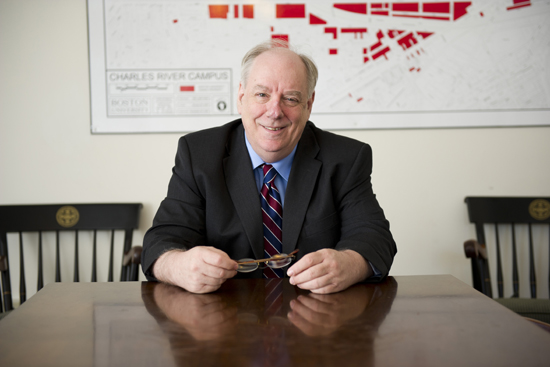New AVP for Government and Community Affairs Named
Robert Donahue ensures “continuity, institutional memory”

Having served the University for more than two decades as director of city relations, Robert Donahue will become associate vice president for government and community affairs as of July 1.
“Bob Donahue has earned the respect of government officials, neighborhood leaders, and his colleagues across the University over the past 25 years while serving as a key member of our Government and Community Affairs staff,” says President Robert A. Brown. “He knows how to balance the needs of the University and the concerns of the community in discussions about topics ranging from campus development and neighborhood issues to government policy and legislation.”
Brown is confident, he says, that Donahue will help Boston University maintain excellent relations with state government and with the communities of Boston and Brookline.
Donahue’s promotion follows the announcement that Edward King, vice president for government and community affairs, will be leaving June 30. The two have worked together for nearly their entire careers at BU, a plus for state and city officials and Commonwealth Avenue neighbors concerned about maintaining a strong relationship with the University.
“With Bob’s appointment, we have someone in a senior role who is both superb and also has a great level of continuity and institutional memory here,” says Stephen Burgay, vice president of marketing and communications.
While Donahue will assume responsibility for state and city relations, a new position will be created to deal with federal government relations—a sector whose importance will grow as the University receives more federal funding for research.
Donahue says he caught the politics bug when he was a college student in the 1960s, and worked on George McGovern’s presidential campaign. He has since been involved in a string of political campaigns, including that of former President Jimmy Carter, the late Senator Ted Kennedy (Hon.’70), Boston Mayor Thomas Menino (Hon.’01), and BU President Emeritus John Silber (Hon.’95), who ran unsuccessfully for governor of Massachusetts in 1990.
“I enjoy the interaction,” says Donahue of his current job. “It’s not combat, but it is politics, and politics at a different level.”
Donahue credits Brown with improving and expanding the campus, strengthening community relations, and positioning BU as a nationally recognized research institution. “Bob has done a masterful job of strategy for the next generation,” he says. “Following his plan is probably the most important thing we do.”
Maintaining strong ties to the city of Boston is also a big part of Donahue’s job, which entails obtaining building permits for new construction projects and working closely with the Boston City Council.
“Almost everything we do on a daily basis we connect somewhere with the city,” he says. “I cannot name any other institution that has that same relation with the city.”
In his new role, he will also track state legislation that affects BU, and work with various executive offices addressing issues such as environmental affairs and public health.
Donahue’s overriding goal is to make sure that BU community members continue to be good neighbors and citizens. “Being there and being able to answer complaints and being transparent about our actions is very important to maintaining trust in the community,” he says.
Leslie Friday can be reached at lfriday@bu.edu; follow her on Twitter at @lesliefriday.
Comments & Discussion
Boston University moderates comments to facilitate an informed, substantive, civil conversation. Abusive, profane, self-promotional, misleading, incoherent or off-topic comments will be rejected. Moderators are staffed during regular business hours (EST) and can only accept comments written in English. Statistics or facts must include a citation or a link to the citation.